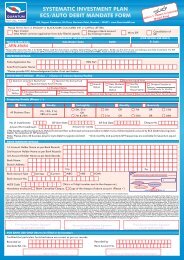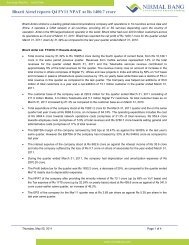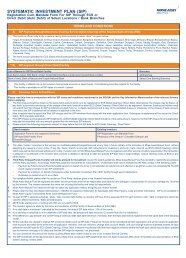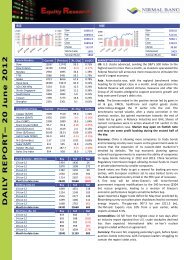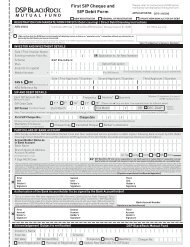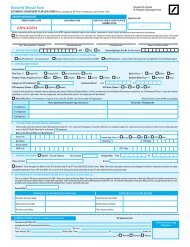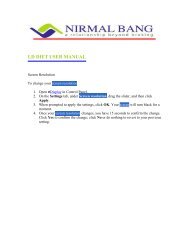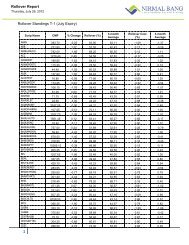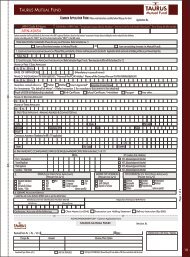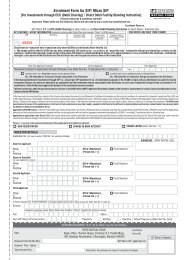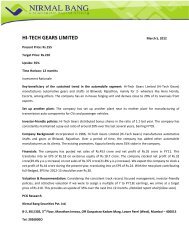Institutional Equities - Online Share Trading
Institutional Equities - Online Share Trading
Institutional Equities - Online Share Trading
You also want an ePaper? Increase the reach of your titles
YUMPU automatically turns print PDFs into web optimized ePapers that Google loves.
<strong>Institutional</strong> <strong>Equities</strong><br />
Investment Arguments<br />
Extension of licence period of Mumbai power distribution company<br />
Mumbai discom includes Dahanu power generation (500MW), transmission network from Dahanu to Mumbai<br />
area and the distribution network in Mumbai suburbs with regulated equity of Rs22bn. MERC has extended<br />
the licence period in suburban Mumbai (which had expired on 15 August 2011) by another 25 years. It was<br />
also clarified that new licencees shall have to lay their own distribution network for distributing electricity, as<br />
the existing network belongs to the company. We believe this is a positive development which will eliminate<br />
the overhang and lead to re-rating of Mumbai discom. We have valued the Mumbai suburbs power<br />
distribution business at Rs119/share (implied P/BV of 1.4x and accounting for 16% of our SOTP) at a<br />
CoE of 13.5%, given the fix return of 16% on regulated equity.<br />
Exhibit 8: Regulated equity<br />
Segment Regulated equity (Rsmn) RoE (%)<br />
Distribution 14,900 16<br />
Transmission 1,500 15<br />
Generation 5,500 23<br />
Total (Mumbai discom) 21,900 -<br />
Delhi discoms (BRPL&BYPL) 22,000 16<br />
Source: Company, Nirmal Bang <strong>Institutional</strong> <strong>Equities</strong> Research<br />
Cross subsidy charges lead to reduction in subscriber migration<br />
MERC has approved cross-subsidy charges to customers who have migrated to Tata Power Company. Crosssubsidy<br />
charge would be levied over and above the wheeling charges. This would allow the company to<br />
charge a higher tariff to migrated customers in order to subsidise low-end customers. Earlier, Tata Power<br />
Company was able to poach high-end customers of Reliance Infrastructure as Tata Power Company’s tariff,<br />
even with wheeling charges, were lower. Once cross-subsidy charges are levied, there will not be much<br />
difference between Reliance Infrastructure and Tata Power Company’s tariff and hence, the cross-over of<br />
customers is expected to reduce.<br />
Exhibit 9: Customer base<br />
Exhibit 10: Electricity units sold<br />
Source: Company, Nirmal Bang <strong>Institutional</strong> <strong>Equities</strong> Research<br />
Source: Bloomberg, Nirmal Bang <strong>Institutional</strong> <strong>Equities</strong> Research<br />
Approval for regulated assets worth Rs 23bn should lead to reduction in debt<br />
The company’s accumulated regulatory assets (the gap between power cost and tariff to consumers) of Rs<br />
23bn has increased its debt by the same amount. MERC has approved regulatory assets of Rs 23bn, which<br />
will be recovered over a period of time. Apart from this, the company is now levying charges based on the cost<br />
of electricity and as result no regulatory assets are getting built.<br />
44 Reliance Infra



